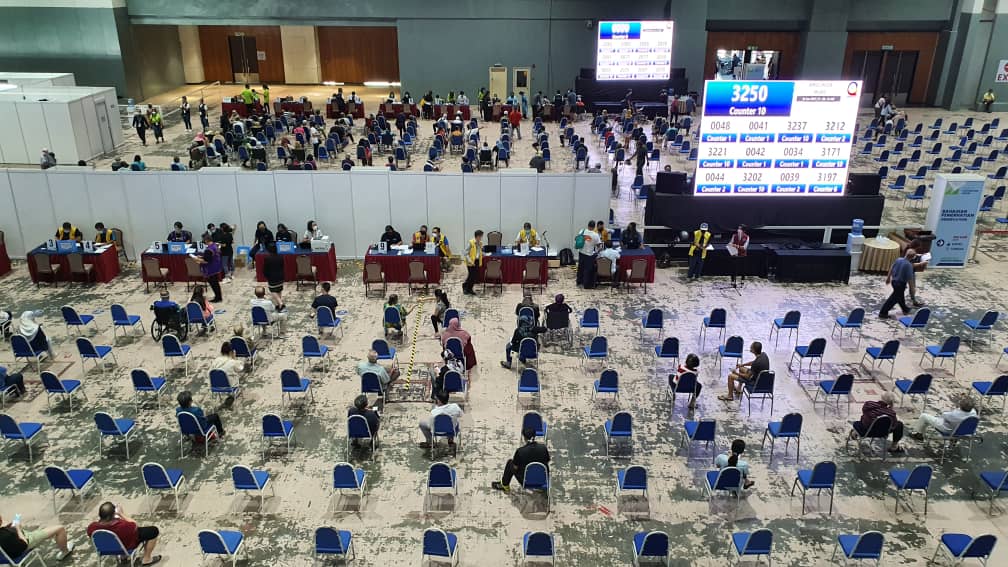KUALA LUMPUR, Dec 24 – The Ministry of Health (MOH) has not found any casualties directly caused by Covid-19 vaccination, although 561 deaths were officially reported among vaccine recipients, Khairy Jamaluddin said.
According to the health minister’s December 16 Dewan Negara reply, 561 fatalities occurred within a short period of time following coronavirus immunisation, but investigation and evaluation by experts in the Covid-19 Vaccine Special Pharmacovigilance Committee (JFK) under MOH found that pre-existing disease was the main cause of death for 414 victims.
JFK, which consists of consulting experts from various related fields, has yet to release casualty assessments on the remaining 147 deaths among Covid-19 vaccine recipients.
Since the beginning of the National Covid-19 Immunisation Programme (PICK) until December 8, a total 973,537 self-responses, or responses related to effects of vaccination, were recorded in MOH’s MySejahtera application. That is equivalent to 17.9 responses per 1,000 doses.
Meanwhile, a total of 23,558 reports of adverse effects were received through the existing immunisation reporting system, which is equivalent to 0.43 reports for every 1,000 doses of vaccines administered.
Of these, 1,605 reports were classified as serious — equivalent to 0.03 reports for every 1,000 doses given — in which Covid-19 vaccine recipients received hospital treatment for further monitoring and treatment for several days.
Senator Lim Hui Ying had asked Khairy to provide a detailed report and state the cause of deaths after Covid-19 vaccination.
“All reports that have been categorised as serious, including death cases among reported vaccine recipients, will be thoroughly investigated by the relevant health facilities,” Khairy stated in a written Dewan Negara reply on December 16.
He said the investigation will take into account clinical information as well as a full post-mortem report performed, if any.
“The investigation report will then be submitted to the Covid-19 Vaccine Special Pharmacovigilance Committee (JFK) to conduct a causality assessment, to confirm the relationship between side effects and the vaccine taken.”
Senator Aknan Ehtook separately asked Khairy in the Dewan Negara to state the influence of religion or personal beliefs among individuals in their decision to reject Covid-19 vaccines.
Khairy mentioned several studies and surveys related to the acceptance and rejection of Covid-19 vaccines — including findings from the University of Malaya in April 2020, MOH Clinical Research Institute in August, 2020, MOH Health Education Division in December 2020 and Universiti Sains Islam Malaysia in January 2021 — that revealed there is indeed a desire to reject the vaccines on religious factors or personal beliefs.
However, the percentage of respondents who intend to reject Covid-19 vaccines on such factors is low, compared to other major factors such as safety, efficacy, side effects and the manufacturing content of Covid-19 vaccine.
“Although the percentage of rejection is small, MOH always works closely with religious authorities to strengthen people’s understanding of the Covid-19 vaccine from a religious point of view,” Khairy added in a written parliamentary reply to Aknan on December 16.
Among the activities carried out are promoting the importance of the Covid-19 vaccine through talk shows on television and radio by experts from MOH and religious authorities.
Apart from that, religious authorities have also published reference materials related to Covid-19 vaccines from a religious point of view and promoted the importance of taking the coronavirus vaccine jabs in the sermon text of the Friday prayers.
Khairy has acknowledged Covid-19 vaccine hesitancy challenges in the country and suggested providing open data and confronting anti-vaxxers directly to solve this issue.
About 99 per cent of adults in Malaysia have been fully inoculated against the coronavirus. Nearly 80 per cent of the total population have completed Covid-19 vaccination.
However, there appears to be serious hesitancy against booster vaccination. Only 22 per cent of adults aged 18 and above – who are currently eligible for additional shots – have been boosted.
The government is now making boosters de facto mandatory for all those aged 60 and above and all adults who initially received the Sinovac vaccine, as these individuals will lose their “fully vaccinated” status on MySejahtera if they do not take their extra shot by February. Vaccine passes are ubiquitously used for entry into public premises.








